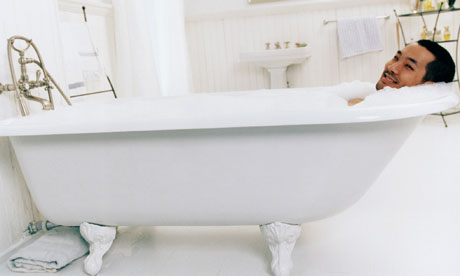Germany’s careful toilet-flushing is a drop in the water-conservation ocean
Germans are way ahead of Brits when it comes to saving water domestically. But politicians avoid the big issue: agricultural use
- guardian.co.uk, Wednesday 18 April 2012 12.34 BST
- Article history

While Britain frets about the drought, Germany can’t get enough of saving water. Germans are good at saving water, so good in fact that they have created a problem for their canalisation system: many pipes are clogged with grease, excrement and leftovers because they aren’t being flushed sufficiently with water. Especially in the summer, gutters in German cities can reek horribly. In some parts of the country, water suppliers even have to flush their pipes artificially with hundreds of thousands of litres of water.
We Germans have always been keen to be best in class when it comes to saving water. Our toilets have a special water-saver button for flushing after you have a wee, we switch off the tap when we brush our teeth, we try hard not to splash too much when we wash our cars. Last year Germany only used 124 litres of water per head per day – down from 144 litres in 1991. In Britain the current figure is 150 litres.
That might be very impressive on Germany’s part, and shaming on Britain. But the real question is whether small gestures like that really make a difference. In the long run, the few drops you save when drinking, cooking, flushing or washing up are of little importance.
It is products, not activities that waste most water. Making a a 200g bag of crisps uses 135 litres, a beefburger 2,400 and a steak 4,000. A cotton T-shirt gulps up 4,100 litres, a brand new car as much as 450,000.
Of course you can argue with the details here – there are always slightly greener alternatives. But you can’t argue much with the so-called water footprint which shows how carelessly we treat Earth’s most valuable resource. On average, every person on this planet is responsible for an incredible 1.4m litres of water usage per year: that’s 8,600 bathtubs with 160 litres of water each. Ninety per cent of this is employed in agriculture: that’s where proper water-conservation needs to happen. But apparently politicians care little to do anything about it, be it in London, Berlin or Brussels.
It’s quite possible that there will be more frequent drought warnings in the future. National governments will have to find ways of dealing with the problem. The first step might have to be a fight with the farmers, industrialists and lobbyists, and not just those on their doorstep.
And there are plenty of proposals on the table that politicians should consider: be it a water tax, whereby those who used rivers to cool their factories will have to cough up, using agricultural subsidies as rewards for careful water usage, or a water limit across the industry. Instead, environment secretary Caroline Spelman seems to be focusing on telling ordinary people to have fewer baths.
Her German counterparts, who pride themselves on their teacher’s-pet reputation, are no better in that respect, by the way. Angela Merkel may have listened to environmentalist concerns once she realised that popular opinion in Germany was against nuclear power. But she doesn’t look keen to boost her green credentials any further. It’s the same across the globe: politicians like giving people the feeling that they are doing something good for the environment when they turn off their taps. But sadly that’s not enough. In the long term, feel-good environmentalism won’t save the planet.
• Follow Comment is free on Twitter @commentisfree
